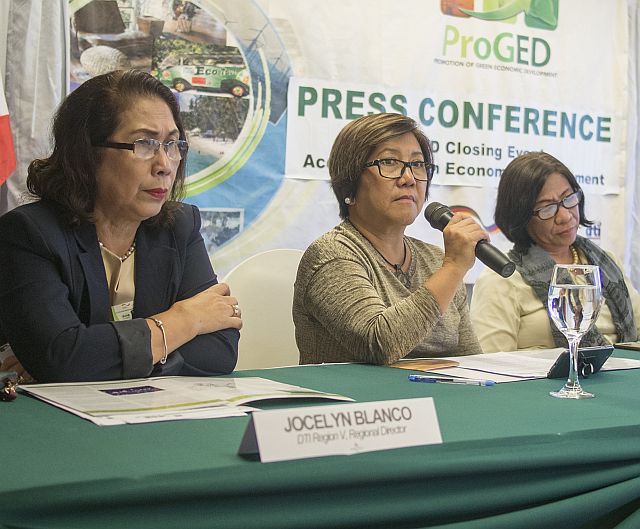
Asteria Caberte, Department of Trade and Industry in Central Visayas (DTI-7) director, (center) discusses the ProGED project during the culminating event of the project. With her are Jocelyn Blanco, DTI-5 director (left) and Lydia Guevarra, DTI resource generation and management services director.
(CDN
PHOTO/CHRISTIAN MANINGO)
Going green is a way for small businesses to become competitive.
Department of Trade and Industry Central Visayas (DTI-7) Director Asteria Caberte said this as she cited the benefits gained by 94 percent of micro, small, and medium-size
enterprises (MSMEs) in the country that adopted green or environment-friendly practices.
Caberte said these MSMEs reportedly have had decreased production costs and increased sales.
She said this also helped open their businesses to new markets because even on the domestic side, there is a strong demand for eco-friendly products.
In Cebu, among those considered as “green” enterprises are furniture exporter Nature’s Legacy, Avatar Accessories, and ECHOstore.
More MSMEs
Caberte said that this shows that more MSMEs in the country are becoming environmentally conscious as the demand for “green” products and practices in the international market increases.
She said that importing countries would now require green products or products which were created with the least impact to the environment.
“If your market tells you to go green, you are pushed against the wall. You have to go green no matter what,” she said during a press conference on the culmination of the Promotion for Green Economic Development (ProGED) project in Cebu City on Tuesday.
Caberte said Europe and the US are the top two markets that patronize green products where some companies even audit their exporters’ operations.
ProGED
ProGED is a joint undertaking by the Philippines through DTI and Germany through the Deutsche Gaesellschaft für Internationale Zusammenarbeit (GIZ), which aimed to help MSMEs adopt greening and climate resilience initiatives to enhance their competitiveness.
Implemented first in Cebu and Bohol in 2013, the project is now present in 30 provinces across seven regions in the country.
Since then, 544 MSMEs in the Philippines have integrated greening practices into their businesses both at the levels of management and in operations.
Caberte said that they initially found it hard to reach out to MSMEs because they had fixed mindsets on how to run a business, but this has already been changed since the full-speed implementation of the ProGED project.
Strategies
Majority of the greening strategies adopted were in the areas of energy efficiency (using LED lights or turning off appliances when not in use), solid waste management (proper segregation), environment-friendly supply and local procurement, and water savings and waste water management.
Various industry clusters such as tourism, processed food, gifts, decors, housewares, coffee, cacao, coco coir, rubber, and bamboo are among those integrating environment-friendly measures in their businesses.
“More than one hundred green enterprises have been awarded and publicly recognized for their green practices,” said Dr. Volker Steigerwald, GIZ-ProGED program manager.
He added that 60 environment-friendly projects were implemented while around 40 resolutions were passed by GED networks endorsing environment-friendly policies in the last three years.
Financing
Lydia Guevarra, DTI director for resource generation and management service, said greening initiatives don’t always require financing.
There are low-cost greening initiatives that MSMEs can adopt such as changing their mindset on energy efficiency and water management, she said.
Guevarra said higher-cost strategies may already include the acquisition of solar panels or the construction of a rainwater catchment facility, which most small businesses cannot afford.
The German component of the project will end on Dec. 31, but GED strategies are set to be incorporated in all programs and activities of the DTI.
By next year, DTI will become the lead national government agency promoting GED in the Philippines.